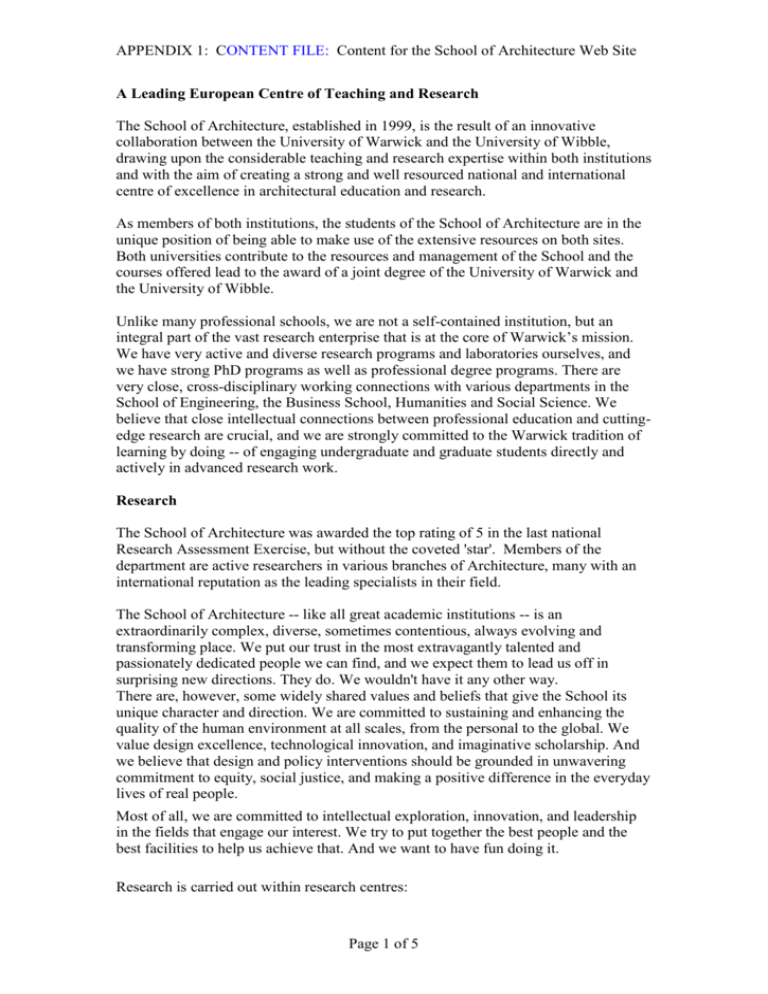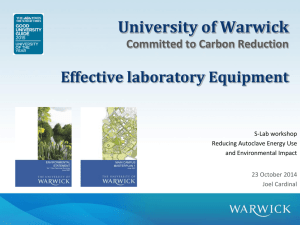University of Warwick - School of Architecture
advertisement

APPENDIX 1: CONTENT FILE: Content for the School of Architecture Web Site A Leading European Centre of Teaching and Research The School of Architecture, established in 1999, is the result of an innovative collaboration between the University of Warwick and the University of Wibble, drawing upon the considerable teaching and research expertise within both institutions and with the aim of creating a strong and well resourced national and international centre of excellence in architectural education and research. As members of both institutions, the students of the School of Architecture are in the unique position of being able to make use of the extensive resources on both sites. Both universities contribute to the resources and management of the School and the courses offered lead to the award of a joint degree of the University of Warwick and the University of Wibble. Unlike many professional schools, we are not a self-contained institution, but an integral part of the vast research enterprise that is at the core of Warwick’s mission. We have very active and diverse research programs and laboratories ourselves, and we have strong PhD programs as well as professional degree programs. There are very close, cross-disciplinary working connections with various departments in the School of Engineering, the Business School, Humanities and Social Science. We believe that close intellectual connections between professional education and cuttingedge research are crucial, and we are strongly committed to the Warwick tradition of learning by doing -- of engaging undergraduate and graduate students directly and actively in advanced research work. Research The School of Architecture was awarded the top rating of 5 in the last national Research Assessment Exercise, but without the coveted 'star'. Members of the department are active researchers in various branches of Architecture, many with an international reputation as the leading specialists in their field. The School of Architecture -- like all great academic institutions -- is an extraordinarily complex, diverse, sometimes contentious, always evolving and transforming place. We put our trust in the most extravagantly talented and passionately dedicated people we can find, and we expect them to lead us off in surprising new directions. They do. We wouldn't have it any other way. There are, however, some widely shared values and beliefs that give the School its unique character and direction. We are committed to sustaining and enhancing the quality of the human environment at all scales, from the personal to the global. We value design excellence, technological innovation, and imaginative scholarship. And we believe that design and policy interventions should be grounded in unwavering commitment to equity, social justice, and making a positive difference in the everyday lives of real people. Most of all, we are committed to intellectual exploration, innovation, and leadership in the fields that engage our interest. We try to put together the best people and the best facilities to help us achieve that. And we want to have fun doing it. Research is carried out within research centres: Page 1 of 5 APPENDIX 1: CONTENT FILE: Content for the School of Architecture Web Site Architectural Science Group Architectural Practice Group Architectural Science Group This Group has pioneered research on energy efficiency, environmental design and other aspects of sustainability, developing an infrastructure of research methods and tools, including computer models, an environmental laboratory and building measurement and social survey procedures. The Group has an international reputation demonstrated by its overseas collaborative links and research projects. It carries out research on both individual buildings and at the urban scale. Architectural Practice Group This Group studies the processes of architectural design, including construction law, economics, process and the strategic management of estates. The Group has national links with the RIBA in relation to current legal issues in the construction industry. Economic research relates to the themes of life cycles of firms, division of labour among design and construction, and innovative uses for Welsh slate. Work on the design process includes the production of a Design Manual for Wales and collaborative research with Wibble University and Westbury Homes has studied the house building process. Research is also carried out on the participation approach to achieving sustainable design, combining social and ecological design issues. Courses BA (Hons) Architecture The BA honours degree offers an unrivalled educational experience in its richness and its variety. It covers a broad territory of subjects, embracing the arts and humanities, science and technology and develops a range of skills. The degree can be seen as both an education in its own right and as the first step on the path to eventual training for professional practice as an architect. Master of Architecture The Master of Architecture (MA) graduate degree programme offers complete, accredited curriculum providing approved professional standing. As with all such degrees, the course of study is highly demanding, with a large proportion of the curriculum being assigned to core, required coursework. Within this challenging programme, opportunities to develop identity and special skills are made possible through the selection of topic design studios, thoughtful engagement with electives and, especially, through the execution of the Graduation Project / Thesis. Master of Advanced Studies in Architecture Page 2 of 5 APPENDIX 1: CONTENT FILE: Content for the School of Architecture Web Site The School of Architecture’s Master of Advanced Studies in Architecture programme [MASA] supports students in taught studies characterised by close collaborative links with faculty. The School offers an intimate milieu for the exchange of research and ideas among students of an internationally diverse background. The School is also able to draw upon related disciplines such as the Community and Regional Planning, Landscape Architecture, Civil Engineering, Geography and Fine Arts. Recently the programme has been enriched by the inclusion of students from related disciplines. All of our teaching is informed by our research. We were one of only two UK Departments to score maximum points in the recent national Teaching Quality Assessment exercise. PhD and MPhil Research Degrees The subject areas that the School can offer to candidates for research degrees relate directly to the research fields that the staff within our research centres are engaged in. The aim of a research student's work is to produce a valuable written piece of research (a thesis) which embodies the methods and results of research. In the case of a PhD degree, the results should amount to an origination contribution to learning in the field. A research degree is confirmation that its holder has gained expertise in developing and employing research methodology and drawing conclusions from its results. It is an excellent training for those wishing to pursue a career in research in higher education and industry. Candidates may study at the School for research degrees full-time or part-time. Fulltime PhD candidates normally study for 3 years unless they are exempt from the probationary year and are allowed to study for 2 years. Part-time PhD students normally study for 5 years unless they are exempt from the probationary period and are permitted to study over 3 years. Full-time study of the MPhil degree is normally 1 year but can be 2 years. Part-time study tends to take place over 2 years but can be over 3 years. The length of time quoted above refers to the time spent in completing a planned programme of research. There is additional time allowed for writing up the research in the form of a thesis but this is governed by strict time limits. Candidates are guided through their research by experienced supervisors with suitable knowledge of the candidate's chosen research area. The candidate's written thesis is examined by an internal and external examiner. In the case of a PhD and MPhil, an oral examination is required. If successful, the candidate is informed that they are approved for the degree they have studied. Candidates for postgraduate degrees must apply formally using the application form, which is available inside the Postgraduate Prospectus. Teaching Although we are careful to respect established traditions, institutional structures, and job market realities in our professional degree programs, we are not intellectually constrained by conventional disciplinary boundaries. The School's activities range widely across architecture, urban studies and planning, real estate, media arts and sciences, and the visual arts. Our community includes professional designers and Page 3 of 5 APPENDIX 1: CONTENT FILE: Content for the School of Architecture Web Site planners, historians and critics, social scientists, civil and mechanical engineers, computer scientists, media technologists, public artists, graphic designers, and many more. We delight in the unexpected intersections of interest that develop among our members, and we understand that the really innovative and exciting intellectual action often occurs at the boundaries of traditional fields. Our outlook is global. Students and faculty come to the School of Architecture from all over the world, and our alumni are to be found everywhere. We are vitally concerned with understanding and responding to today's complex interactions of local communities and cultures with systems of global interconnection, and with preparing students to work in a world where time and difference are electronically compressed. News Degree Show Saturday 16th June to Wednesday 20th June Open to the Public (Admission Free) 10am to 4pm Sat & Sun, 10am to 6pm Mon/Tue/Wed Staff - Members of the department are active researchers in various branches of Architecture, many with an international reputation as the leading specialists in their field. Fred Bloggs Senior Lecturer Email: fred.bloggs@Warwick.ac.uk Tel: 22345 Ann Ford Senior Lecturer Email: Ann.Ford@warwick.ac.uk Tel: 22432 Simon Smith Lecturer Email: Simon.Smith@warwick.ac.uk Tel: 21433 Reginald Smith Resources Manager Email: Reginald.Smith@warwick.ac.uk Tel: 21403 Prof. Dave Nudgeit Director Tel: 25555 Alex Clarkson Senior Research Fellow Email: Alex.Clarkson@warwick.ac.uk Tel: 21402 Page 4 of 5 APPENDIX 1: CONTENT FILE: Content for the School of Architecture Web Site Dr W Forster Research Fellow Email: w.forster@warwick.ac.uk Tel: 21405 Ivor Pitchford Research Fellow Email: Ivor Pitchford @warwick.ac.uk Tel: 21408 Chris Powell Senior Research Fellow Email: Chris.Powell@warwick.ac.uk Tel: 21402 Dr Fred Alexander Research Fellow Email: fred.alexander@warwick.ac.uk Tel: 21405 Bob Cooper Research Fellow Email: bob.cooper@warwick.ac.uk Tel: 21408 Peter Doit The Manager Tel: 24147 Sarah Smith Secretary Email: Sarah.Smith@warwick.ac.uk Tel: 23462 Contact Information School of Architecture, University of Warwick, Coventry, CV4 7AL. UK General email address: SchoolofArchitecture@warwick.ac.uk Images available to use on the website School of architecture logo Location map for the school of architecture Page 5 of 5








